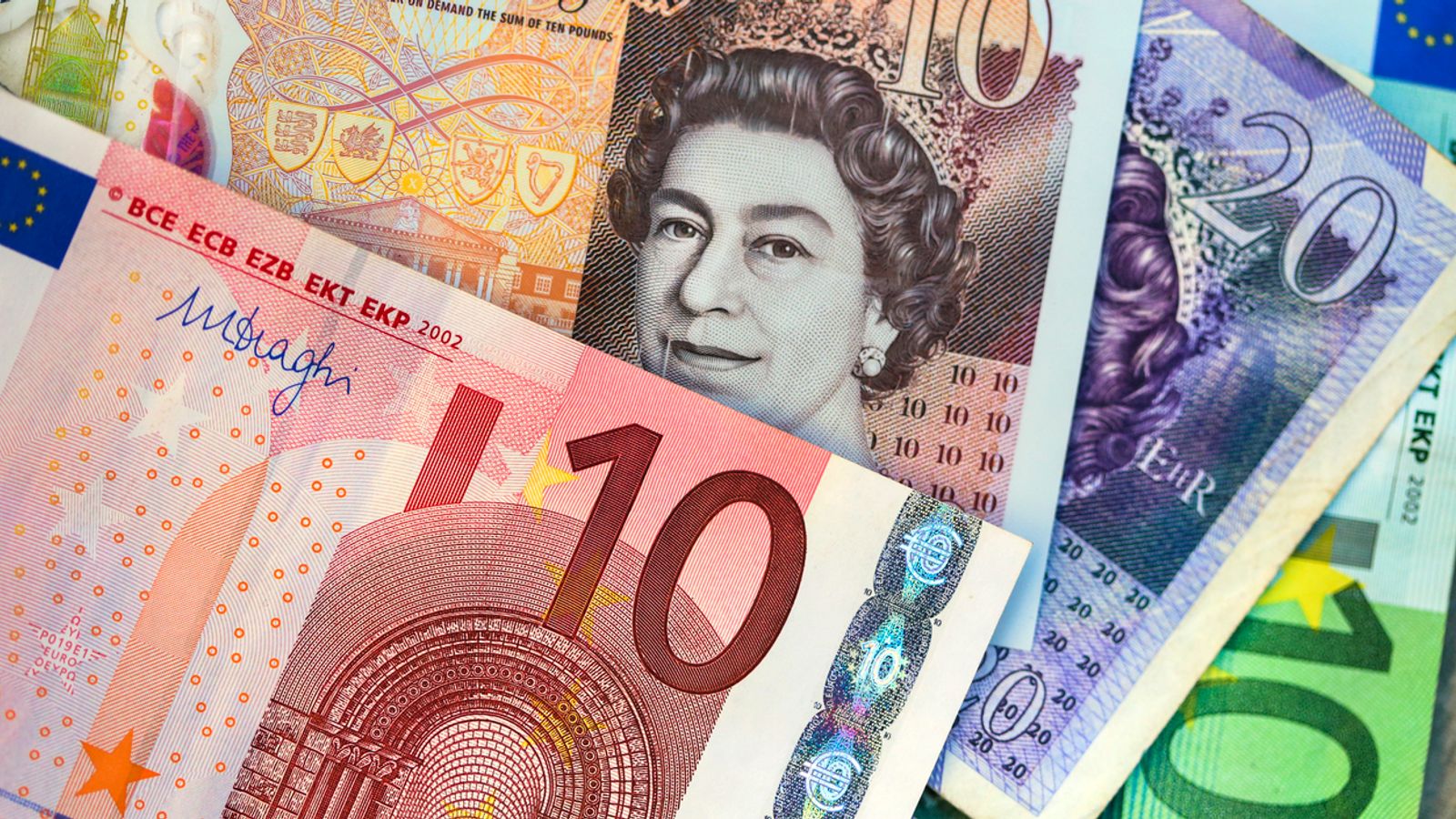Holiday money – where to buy it, how to avoid fees, and one thing you must not do
By Brad Young and Katie Williams, from the Money team
UK residents spend billions of pounds abroad each year, but it can be difficult to know how to make sterling go as far as possible.
With summer fast approaching, so too are the opportunities to splash out on holidays, so the Money team spoke with three travel experts to find out when, where and how to pay abroad.
CREDIT CARD
“The cheapest way to spend overseas is often on plastic, if you’ve got the right plastic,” said James Jones, head of consumer affairs at Experian.
“Using credit and debit cards can be a great way to get the very best exchange rates.”
He said rates offered by currency exchange shops are usually “much less attractive” than those offered on some cards, which were much closer to the rates the banks use themselves.
Fees could wipe out any gains
But it’s essential to be aware of things like non-sterling transaction fees, cash withdrawal fees and credit card interest.
So shop around for a card with travel rewards, Mr Jones said – and do this before your trip.
“You probably need to give yourself, ideally, six weeks.”
Extra protection
When you book a trip between £100 and £30,000, try and pay for some of it on a credit card to get “extra protection” under section 75 of the Consumer Credit Act, said Mr Jones.
That means the card provider is jointly responsible with the retailer if something goes wrong, such as arriving at a hotel only to find it has closed down.
If you are using a credit card, make sure you are can pay it off in full to avoid interest charges, said Sean Tipton from the Association of British Travel Agents (ABTA).
One trap you must not falling into
An increasingly common trap when paying with card (credit or debit) is being presented with the option to pay in the local currency or in pounds, said Mr Jones and Mr Tipton.
While paying in sterling might “seem like a wonderful convenience” you will ultimately be paying “quite a bit more for the purchase”, Mr Jones said.
If you pay in pounds, the local retailer’s bank sets the exchange rate, but if you pay in the local currency, your UK bank sets the rate.
DEBIT CARDS
“Some service providers don’t apply fees for overseas use on their regular UK debit cards,” says Moneyfacts – but you must always check as some incur big fees.
Alternatively, “some service providers offer specialist travel debit cards that don’t impose non-sterling transaction fees and cash withdrawal fees”.
PREPAID TRAVEL CARDS
If you’re looking to avoid a credit check, prepaid cards can be loaded with multiple currencies and work like a debit card, without being connected to your bank.
“Typically, prepaid travel cards will offer competitive or even no charges for foreign usage, which can make them a cheaper alternative to using a normal credit or debit card while on holiday,” says MoneyFacts.
One of the most popular prepaid cards, Revolut, uses its own exchange rates, which might not always be the best you can find – and while it is fee free on weekdays, there are charges at weekends, so do your research.
Also be aware – prepaid cards do not offer purchase protection like a credit card and aren’t regulated by the Financial Conduct Authority.
CASH
“Don’t rely solely on a card – it can backfire on you if you do,” said Mr Tipton.
Some taxis only take cash, leaving you to face hefty charges withdrawing from an ATM.
In some countries, like Argentina, it can be difficult to get money out of ATMs without a local bank account, Mr Tipton said.
Mr Jones added: “If you’re in a very remote part of the world that actually doesn’t have many ATMs and maybe where cash is king, then that might dictate what you need to do.”
Where and when to get cash
“I’d strongly recommend [to] get some cash out in the UK,” said Mr Tipton.
It can be difficult to find a bureau de change in some developing nations, and ATMs have “started introducing quite hefty charges” across the board, he said.
The exceptions are countries with really high inflation rates, where it may make more sense to get cash out when you arrive, he added.
When to exchange currency really depends on the destination, said Laura Plunkett, head of travel money at the Post Office.
“Exchange rates change frequently, so if you have time, do your homework and lock in a rate when it is good.”
What is a good exchange rate for Europe?
Some 80% of British holidays abroad take place in the Eurozone, said Mr Tipton.
The rate has remained “fairly stable”, but if you see the pound increasing in value that may be the time to buy a larger amount of Euros for a couple of years in advance, he added.
Mr Tipton said 1.2 to the pound is a “pretty healthy” time to buy, but “it is a bit of a lottery”.
Every year the pound gets stronger against the South African rand, and the same in Argentina, where the peso is “unbelievably weak”, Mr Tipton suggested.
In store or online?
“Most online suppliers will insist on a minimum order value that might be too high for some people, and you’ll have to make sure that you’re home for when it’s delivered,” said Ms Plunkett.
“But typically, rates are better online if that’s an option for you.”




